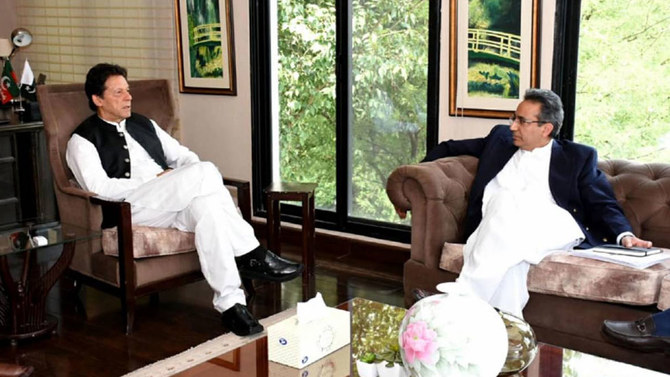KARACHI: Prime Minister Imran Khan has asked his advisor on petroleum to step down from his position to ensure a transparent inquiry into a fuel crisis witnessed by the country in June 2020, announced a senior cabinet member on Friday.
“The Federal Investigation Agency will complete the forensic investigation within 90 days,” Federal Minister for Planning Asad Umar told a news conference in Islamabad. “During this period, the prime minister has directed his special assistant, Nadeem Babar, to relinquish the portfolio. Similarly, the petroleum secretary will also be directed to report to the establishment division as soon as his replacement is decided. This will be done before the investigation begins.”
Umar clarified the decision was only taken to address any misgivings that the two officials would take advantage of their position and interfere with the probe.
“The prime minister wants to ascertain the reasons behind the shortages of petroleum in the country, and the whole chain needs to be investigated,” he added. “The inquiry will be carried out into the losses of billions of rupees that the nation had to suffer.”
Pakistan witnessed an acute fuel shortage in June last year after the government decided to halt the petroleum import amid rising COVID-19 infections and the oil industry restricted market supplies to avoid inventory losses.
The government's decision was announced in the last week of March to support the domestic refining industry and deal with the declining market demand due to strict lockdowns in the country.
However, Pakistani consumers had to face significant problems after the virus-related restrictions were lifted and the demand for fuel went up again.
The situation created a widespread perception that the fuel shortage was deliberately created to mint money since the country’s oil marketing companies are legally bound to maintain significant fuel stocks for a period of 20 days.
“There was no element of corruption and the crisis was primarily triggered by the inability of our decision makers,” Dr. Nazar Abbas Zaidi, former secretary of Oil Companies Advisory Council, told Arab News.
“The June 2020 crisis was triggered by a ban on the import of petroleum products by the ministry officials,” Zaidi, who was also part of a preliminary probe team constituted by the prime minister, said. “Due to that decision, the country was deprived of cheapest oil imports in its history.”
He informed the initial finding of the team was that officials in the country’s regulatory offices and the petroleum ministry lacked “intellectual capacity required for the job.”
Umar said during his news conference, however, that the prime minister was determined to identify all those individuals who had committed the crime since the government wanted to throw them behind bars.
“Tough time has started for the energy ministry which implies improvement of processes in the petroleum sector management,” Tahir Alam, general secretary of the Petroleum Club of Pakistan, said while talking to Arab News. “I hope the findings of this investigation will lead to a reduction in the miseries of petroleum consumers in Pakistan.”
However, other experts did not sound too optimistic.
“No material impact of the outcome of forensic investigation is expected because these things usually take a political turn,” Khurram Hussain, a senior business and economy journalist, commented. “Whenever this report will come, politics will begin to revolve around it.”
Hussain said it was also to be seen if Babar had only been removed for 90 days or the government had fired him in a polite way.
He added that the removal of the prime minister’s advisor was also recommended by a committee that initially looked into the fuel shortage.
















